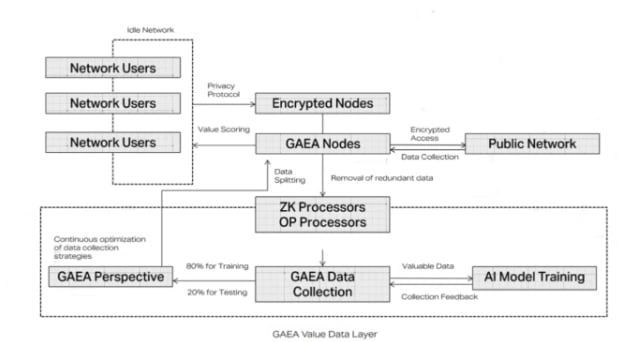위키 구독하기
Share wiki
Bookmark
GAEA
0%
GAEA
GAEA는 이더리움 위에 구축된 레이어 3 퍼블릭 블록체인으로, 사용되지 않는 네트워크 리소스를 활용하여 탈중앙화된 인공지능(AI) 개발을 지원하도록 설계되었습니다. 커뮤니티 중심의 DePIN(탈중앙화된 물리적 인프라 네트워크)로서 GAEA는 퍼블릭 네트워크 데이터를 AI 학습 데이터 세트로 변환하는 것을 용이하게 합니다. [2] [3]

개요
GAEA는 사용하지 않는 네트워크 리소스를 가진 개인과 AI 개발에 이러한 리소스가 필요한 조직을 연결하는 플랫폼을 구축하여 탈중앙화된 인공지능 분야에서 운영됩니다. 이 프로젝트는 사용자 기여에 대한 보상 분배와 같은 프로세스를 자동화하기 위해 스마트 계약을 활용합니다.
이더리움 2.0을 통한 확장성 개선을 포함하여 이더리움 내에서 진행 중인 개발은 GAEA의 광범위한 적용 및 성장에 대한 잠재력을 더욱 뒷받침합니다. 이는 사용자 친화적인 플랫폼을 통해 데이터 주석, 모델 학습 및 AI 배포를 위한 도구를 제공하는 커뮤니티 중심의 DePIN 네트워크입니다. 개인은 기술적 배경에 관계없이 포인트 기반 시스템을 통해 보상을 받는 대가로 사용하지 않는 네트워크 리소스를 공유하여 AI 개발 프로세스에 기여할 수 있습니다.
GAEA는 AI 시스템의 상황적 이해를 개선하기 위해 감성 데이터와 사용자 생성 콘텐츠의 통합을 강조합니다. 블록체인 기술을 기반으로 구축된 이 플랫폼은 투명한 데이터 공유 및 처리를 지원하여 인센티브 기반 참여를 통해 AI 학습의 효과를 향상시키는 가치 데이터 레이어를 구축하는 것을 목표로 합니다.[1] [3] [2] [6]
실리콘 신화
GAEA는 "실리콘 신화"를 데이터가 인간의 상호 작용과 활동을 통해 생성된 생명체로 간주되어 병렬 디지털 차원에 존재하는 개념적 프레임워크로 제시합니다. 이러한 관점에서 인간과 데이터 간의 공생 관계가 확립됩니다. 인간은 데이터를 생성하고 관리하며, 이는 기술 및 사회 발전을 주도합니다.
이 플랫폼은 신화적 창조와 탈중앙화된 디지털 환경의 출현 사이에 상징적인 유사점을 도출하여 Web3 시대의 개인이 실리콘 기반 세계 내에서 창조자 역할을 한다고 제안합니다. [4]
사용 사례
GAEA의 탈중앙화된 네트워크 리소스의 주요 응용 분야는 다음과 같습니다.
- 데이터 스크래핑: 조직은 다양한 IP 주소를 사용하여 IP 기반 제한에 직면하지 않고 다양한 소스에서 공개 데이터를 수집할 수 있습니다.
- AI 학습: 머신 러닝 모델은 방대한 양의 다양한 데이터를 필요로 하며, 분산된 네트워크 리소스를 사용하여 보다 효율적으로 수집할 수 있습니다.
- 분산 컴퓨팅: 이 네트워크는 잠재적으로 대역폭 공유 외에 다른 형태의 분산 컴퓨팅을 지원할 수 있습니다.
- 오픈 소스 AI 개발: GAEA는 네트워크 리소스에 대한 접근성을 높임으로써 대규모 개발을 위한 인프라가 부족할 수 있는 오픈 소스 AI 이니셔티브를 특별히 지원하는 것을 목표로 합니다. [1]
가치 데이터 레이어

GAEA의 가치 데이터 레이어는 탈중앙화된 AI 인프라의 핵심 구성 요소로, 인공지능 학습에 사용되는 데이터 세트의 품질과 효율성을 향상시키도록 설계되었습니다. 분산 네트워크 모델을 통해 데이터 수집, 필터링 및 개선을 최적화하는 데 중점을 둡니다.
- 데이터 수집: GAEA는 사용자의 유휴 대역폭과 컴퓨팅 성능을 활용하여 공개 네트워크에 액세스하고 텍스트, 이미지 및 비디오를 포함한 다양한 데이터 세트를 수집합니다. 참가자는 탈중앙화된 데이터 집계에 기여하는 GAEA 노드를 실행합니다.
- 필터링 및 분할: 수집된 데이터는 중복되거나 관련 없는 콘텐츠를 제거하기 위해 제로-지식(ZK) 프로세서를 사용하여 초기 처리를 거칩니다. 그런 다음 운영 프로세서는 필터링된 데이터를 분산 학습을 위해 관리 가능한 부분으로 분할합니다.
- 최적화 및 피드백: AI 모델 성능과 관련된 지속적인 피드백 루프는 데이터 개선 전략을 알려줍니다. GAEA 노드는 모델 요구 사항에 맞게 데이터 수집 방법을 조정하여 관련성을 보장하고 데이터 세트 품질을 향상시킵니다.
- 레이어 구성: 가치 데이터 레이어는 데이터 획득, 기술적 스크리닝 및 반복적 피드백의 결합된 프로세스를 통해 구축됩니다. 이 시스템은 진화하는 AI 사용 사례에 적합한 동적 데이터 세트 생성을 지원합니다.
- 시장 관련성: 글로벌 AI 및 데이터 관리 시장이 크게 성장할 것으로 예상됨에 따라 GAEA의 인프라는 증가하는 산업 수요를 충족하기 위해 확장 가능하고 최적화된 데이터 처리 서비스를 제공하는 것을 목표로 합니다. [5]
잘못된 내용이 있나요?
